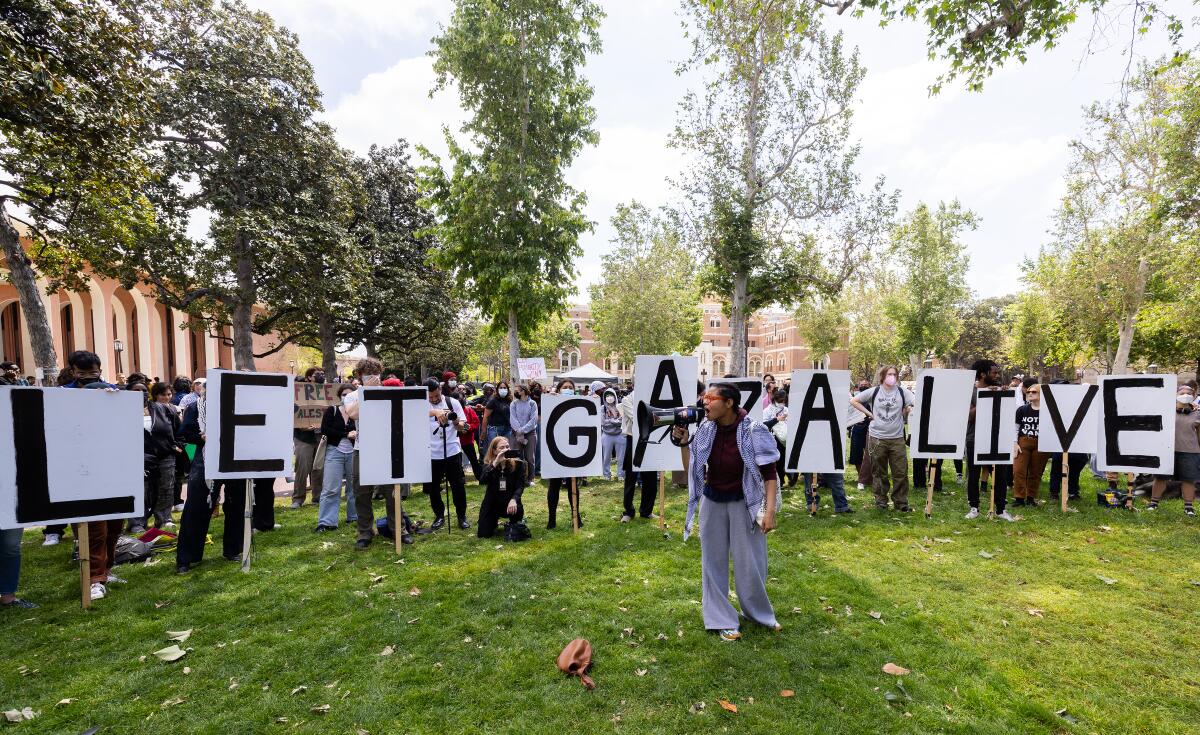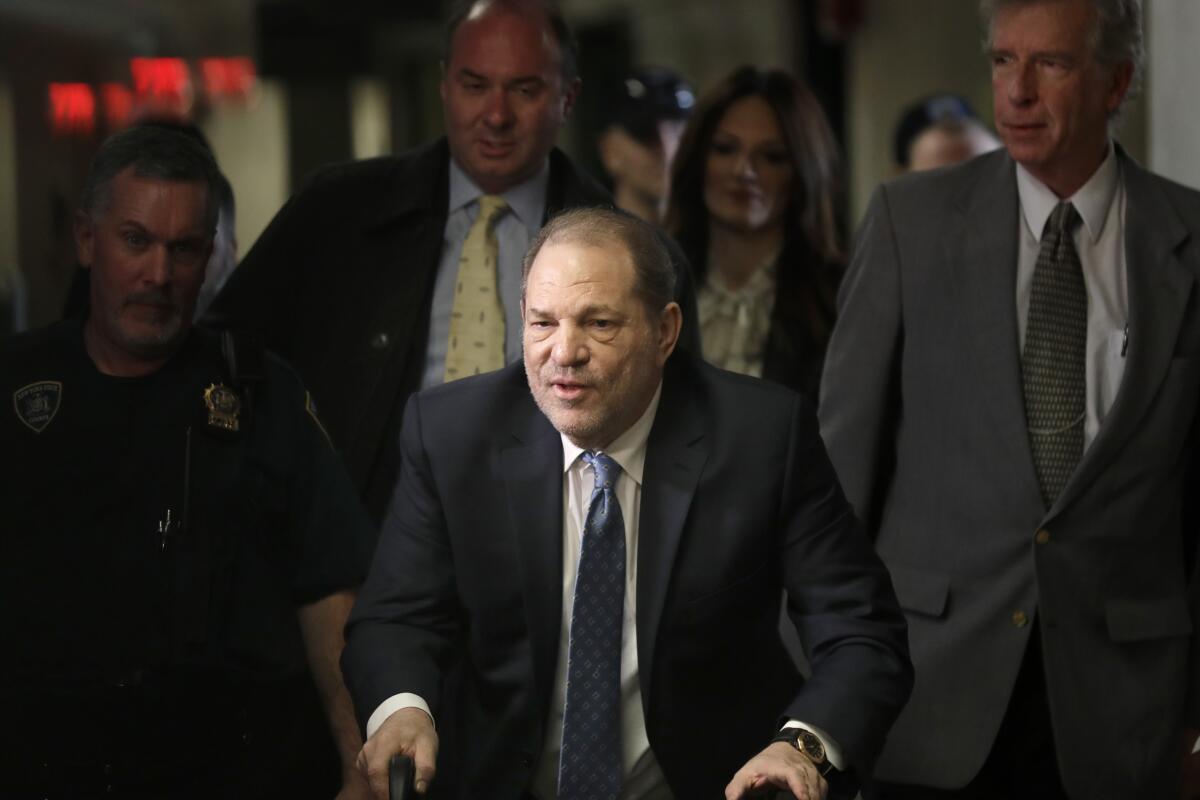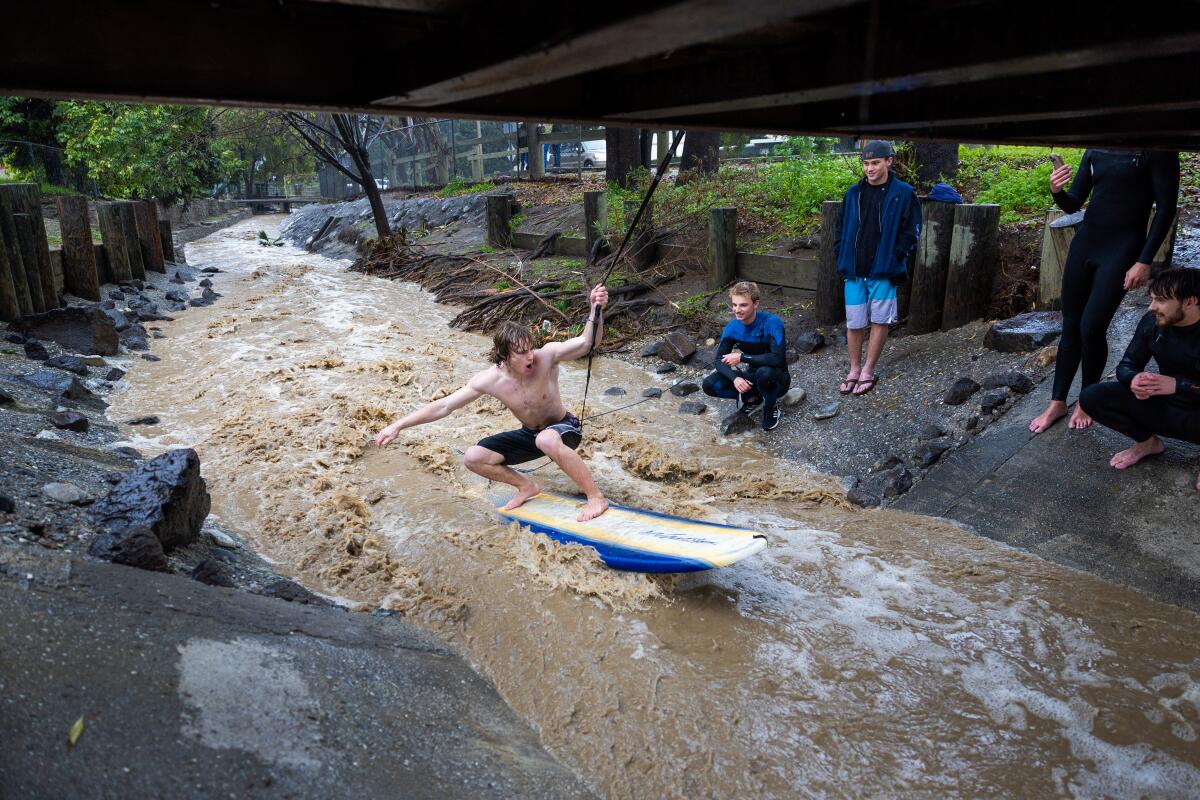Pro-Palestinian encampments are spreading across U.S. colleges. What are the students demanding?

- Share via
Good morning. It’s Friday, April 26. Here’s what you need to know to start your day.
- Pro-Palestinian encampments and protests have spread across college campuses.
- Supreme Court conservatives lean in favor of limited immunity for Trump.
- Perfect your swing at these 9 pleasant L.A. public golf courses.
- And here’s today’s e-newspaper
You're reading the Essential California newsletter
Our reporters guide you through our biggest news, features and recommendations every morning
You may occasionally receive promotional content from the Los Angeles Times.
What do student activists at pro-Palestinian encampments want?
The New York Police Department arrested more than 100 people last week at an encampment formed by student activists on Columbia University’s main lawn in protest against the Israel-Hamas war. Since then, dozens of pro-Palestinian encampments and protests have sprouted up on campuses nationwide.
At UC Berkeley, students and faculty joined the UC Berkeley Divestment Coalition on Monday to establish a Free Palestine encampment on the steps where the 1960s free speech movement originated.
That evening, masked pro-Palestinian protesters occupied an administrative building at Cal Poly Humboldt and barricaded the entrance, prompting administrators to shut down the public university. Officials extended the campus’ closure through the weekend.
On Thursday, several UCLA students pitched their tents in front of Royce Hall. A counter protest also erupted there.
A day prior, organizers at Harvard University set up an encampment at the heart of Harvard Yard, which was closed by administrators in anticipation of pro-Palestinian protests earlier this week.
Los Angeles Police Department officers arrested 93 people on trespassing charges at USC this week, too, clearing the solidarity encampment.
Police ordered student activists and protesters at other colleges — including Yale University, NYU, the University of Minnesota and the University of Texas at Austin — to disperse or face arrest.
The new wave of protest encampments has brought out law enforcement. But students say they are determined to remain at their encampments until their respective universities hear and meet their demands.
What do the student activists want?
The encampments and protests are students’ attempt to focus attention on the Gaza Strip. After the Hamas-led attack on Israel on Oct. 7, in which 1,200 people were killed and 240 were taken hostage, more than 34,000 Palestinians have been killed in Israel’s retaliatory war, according to the Gaza health authorities.
“All student organizing efforts are rooted in the right of return and liberation, in centering Gaza,” Bears for Palestine, a student organization at UC Berkeley, told The Times in an email.
Student activists across the country are asking for a permanent cease-fire in Gaza and an end to U.S. military aid to Israel. Many also say they want to ensure that free speech is upheld at their campuses and that their universities sign on to the boycott, divestment and sanctions movement.
Bears for Palestine said that they will not move “until the university divests,” and are demanding that the university “end the silence” by releasing a public statement calling for an immediate “end to the Gaza Genocide” and calling on U.S. officials to follow suit.
Here are some of their other demands:
- For the university to “divest all its funds from and end all partnerships with Israel by [selling and not repurchasing] any direct holdings.”
- To “ensure the freedom of speech and academic freedom of Palestinian, Muslim, Arab and Pro-Palestinan scholars.”
- Establish a “Palestine Studies program at UC Berkeley.”
- Protect “students, faculty and staff from discrimination and retaliation for protesting and speaking out for Palestine.”
- End “institutional partnerships, starting with study abroad programs in Israel.”
Several student-led organizations across the country, such as Students for Justice in Palestine’s Columbia University chapter, have listed similar demands on social media.
The protests have garnered both support and concerns on campuses. At Columbia, some Jewish students faced antisemitic taunts. At Yale, some Jewish students thought the protests turned hostile toward them.
There is much debate across American universities about whether Israeli divestiture is a good idea — and whether it can even be effective.
“It’s extremely difficult to do with any fairness and accuracy,” a former University of California official told the Wall Street Journal.
Some universities have strongly opposed divesting, saying it is wrong to target Israel.
There is a long history of student protest movements
“Student movements in the United States have been around as long as the modern public university,” said Michael M. Cohen, an associate teaching professor in American studies and African American studies at UC Berkeley.
The current encampments and protests are “well within a deeply worn tradition of student activism on college campuses,” said Cohen.
Cohen believes that the great accomplishments of the civil rights movement and other movements have come through “the risks [taken by] and the radicalism of student activists,” and that history and politics have shown us that the youth activists have been proven right.
“Colleges and universities particularly and then these encampments become organizing spaces,” Cohen said, adding that these spaces enable students to learn more about what is happening through teach-ins and the sharing of “information, stories and experiences.”
Roderick A. Ferguson, a professor at Yale University and author of “We Demand: The University and Student Protests,” said in an email that “we can objectively credit students with helping society preserve and widen democratic ideals and practices, not only in this country but globally.”
However, Ferguson noted that university administrators have learned little from history and that the discourse from when “student activism was being criminalized by media establishments, academic leaders, and political forces in this society” — such as during the Jackson State and Kent State shootings — is being applied to “overwhelmingly peaceful protests at Yale.”
“The people who you would expect to have historical memory around this (or at least access to it, namely administrators) seem content to abandon it entirely,” Ferguson said. “And that’s a recipe for disaster.”
Read more:
- Pro-Palestinian protests grow at California campuses as opposing demonstrators clash at UCLA.
- Amid Gaza protests and ‘hateful graffiti,’ Cal Poly Humboldt closes campus through the weekend.
Today’s top stories

Harvey Weinstein’s conviction reversal
- Harvey Weinstein’s rape conviction is overturned by N.Y. appeals court; California conviction remains.
- Is Harvey Weinstein’s California conviction in jeopardy after N.Y. appeals ruling?
- Hollywood and accusers condemn reversal of Weinstein conviction: ‘We know what happened.’
More big stories
- The Supreme Court’s conservatives lean in favor of limited immunity for Trump as an ex-president.
- Six California House races that could help determine control of Congress.
- Trump is having a bad week. Will it matter in the election?
- Airlines will be required to automatically refund passengers for major flight changes under DOT rule.
- Top advisor to Los Angeles Dist. Atty. George Gascón is charged with illegal use of confidential police records.
- How treatment of miscarriages is upending the abortion debate.
- A deal to buy Skid Row homeless housing fell apart. Here’s why vulnerable tenants and taxpayers are at risk.
- San Diego is now the top border region for migrant arrivals.
- California is trying again to extend unemployment benefits to workers on strike.
- Summer heat is coming. Here’s a new interactive tool to help you deal with your health conditions.
- USC cancels its ‘main stage’ commencement ceremony.
- ‘Rivers in the sky’ have drenched California, yet even more extreme rains are possible.
Get unlimited access to the Los Angeles Times. Subscribe here.
Commentary and opinions
- Sammy Roth: Here are the 32 coal plants still powering the American West.
- Anita Chabria: Supreme Court to pregnant women: Good luck with that.
- Mary McNamara: The crackdown on student protesters shows exactly why we need them.
- Harry Litman: Will Trump be tried for Jan. 6? After Supreme Court arguments, it’s more uncertain than ever.
- Editorial: Sending armed troops to quash peaceful campus protests is a dangerous idea.
Today’s great reads
How athletes and entertainers such as Shohei Ohtani get financially duped by those they trust. Athletes and entertainers lose money because they’re inattentive, make risky investments and overspend on loved ones and expensive toys, financial experts say.
Other great reads
- After scandal, movie producer Randall Emmett is flying under the radar with a new name.
- ‘The bane of retail.’ To prevent theft, many big chains now lock up all kinds of merchandise.
- Nicole Kidman on making ‘Birth’ and why she chooses films that aren’t a ‘soothing bath.’
- Who is the real Martha from ‘Baby Reindeer’? Jessica Gunning says she didn’t need to know.
- Sissy Strolls bring queer people of color together in WeHo.
- How L.A. Chess Club is giving nerd culture a Gen Z makeover.
How can we make this newsletter more useful? Send comments to [email protected].
For your downtime
Going out
- Fore! Perfect your swing at these 9 pleasant L.A. public golf courses.
- This L.A. neighborhood makes you feel seen, and even when it changes its look or tries to get fancy, it always seems to have what you need — even when you don’t know you need it.
- A leading L.A. vegan restaurant goes un-vegan. ‘I knew the vitriol that would come my way.’
Staying in
- 📚 The 26 absolute best L.A. books of all time, ranked.
- 🧑🍳 Here’s a recipe for cherry-amaro coffee tonic.
- ✏️ Get our free daily crossword puzzle, sudoku, word search and arcade games.
And finally ... a great photo
Show us your favorite place in California! We’re running low on submissions. Send us photos that scream California and we may feature them in an edition of Essential California.
Today’s great photo is from Times photographer Allen J. Schaben who captured this shot in February after an atmospheric river unleashed heavy rain in La Mirada Creek Park.
Have a great day, from the Essential California team
Defne Karabatur, fellow
Ryan Fonseca, reporter
Andrew Campa, Sunday reporter
Kevinisha Walker, multiplatform editor and Saturday reporter
Christian Orozco, assistant editor
Stephanie Chavez, deputy metro editor
Karim Doumar, head of newsletters
Check our top stories, topics and the latest articles on latimes.com.
Sign up for Essential California
The most important California stories and recommendations in your inbox every morning.
You may occasionally receive promotional content from the Los Angeles Times.







